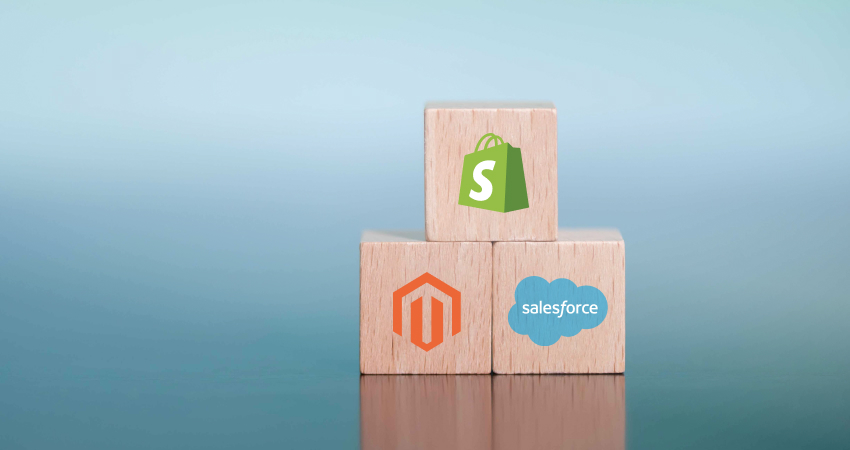Introduction:
Selecting the ideal e-commerce platform is a critical decision for businesses looking to establish or enhance their online presence. With numerous options available, three platforms often stand out: Shopify, Magento, and Salesforce. In this article, we will explore the features, strengths, and considerations associated with each platform to help you make an informed decision on which e-commerce platform is the right fit for your business.
Shopify: Simplicity and User-Friendliness
Shopify is known for its user-friendly interface and ease of use, making it an excellent choice for beginners or small to medium-sized businesses. It offers a hosted solution, meaning you don’t need to worry about managing server infrastructure. Shopify provides a wide range of professionally designed templates, making it easy to create an attractive and functional online store. The platform also offers built-in payment gateways, inventory management, and marketing tools, simplifying the process of running an e-commerce business. However, Shopify’s customization options may be limited compared to other platforms, and extensive scalability may require additional plugins and apps.
Magento: Scalability and Customization Options
Magento is a robust open-source platform that offers extensive customization capabilities and is ideal for large businesses or those with complex e-commerce requirements. It provides a high level of flexibility and scalability, allowing businesses to customize their online stores to meet specific needs. With Magento, you have full control over the server infrastructure and can tailor every aspect of your e-commerce site. It supports a vast number of products, multiple stores, and advanced features like inventory management, personalized marketing, and complex pricing options. However, Magento’s advanced features and flexibility come with a steeper learning curve, requiring technical expertise or professional assistance for setup and maintenance.
Salesforce Commerce Cloud: Enterprise-Grade Solution
Salesforce Commerce Cloud (formerly known as Demandware) is a powerful enterprise-grade e-commerce platform. It offers extensive customization capabilities, scalability, and seamless integration with Salesforce’s suite of customer relationship management (CRM) tools. Salesforce Commerce Cloud provides advanced marketing automation, customer personalization, and omnichannel capabilities, allowing businesses to deliver a seamless customer experience across multiple touchpoints. It is a suitable choice for large enterprises with complex e-commerce operations, as it offers robust functionality, comprehensive analytics, and extensive support. However, Salesforce Commerce Cloud can be more expensive and requires technical expertise for implementation and ongoing management.
Considerations for Choosing the Right E-commerce Platform:
- Budget and Resources: Consider your budget and resources available for platform setup, customization, and ongoing maintenance. Shopify may be more cost-effective for smaller businesses, while Magento and Salesforce Commerce Cloud require a larger investment.
- Scalability and Growth Potential: Evaluate your business’s growth plans and scalability requirements. If you anticipate significant growth and complex e-commerce operations, Magento or Salesforce Commerce Cloud may be better suited for long-term scalability.
- Technical Expertise: Assess your team’s technical expertise and ability to handle platform customization and management. Shopify offers a user-friendly interface, while Magento and Salesforce Commerce Cloud require more technical proficiency.
- Feature Requirements: Identify your specific feature and functionality needs. Consider whether the platform provides essential features like payment gateways, inventory management, marketing tools, and integration capabilities with third-party applications.
- Support and Resources: Evaluate the level of support, documentation, and community resources available for each platform. Shopify has a strong support community, while Magento and Salesforce Commerce Cloud offer extensive documentation and professional support options.
Conclusion:
Choosing the right e-commerce platform is a crucial decision that can significantly impact your online business’s success. Shopify, Magento, and Salesforce Commerce Cloud each offer unique features and strengths to cater to different business requirements. Shopify provides simplicity and user-friendliness, making it an excellent choice for small to medium-sized businesses. Magento offers extensive customization and scalability options, suitable for large businesses with complex e-commerce needs. Salesforce Commerce Cloud is an enterprise-grade solution that integrates seamlessly with Salesforce’s CRM tools and offers advanced marketing and personalization capabilities.
Carefully assess your business’s needs, budget, technical expertise, and growth potential to determine which platform aligns best with your requirements. Consider seeking professional guidance or consulting with e-commerce experts to ensure you make an informed decision that sets your business up for success in the ever-evolving world of e-commerce.

